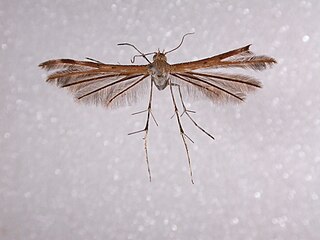
Megalorhipida leucodactyla is a species of moth of the family Pterophoridae that has a pantropical distribution.
Megalorhipida dubiosa is a species of moth in the genus Megalorhipida known from Brazil. Males in this species have a wingspan of about 10 millimetres (0.39 in). Moths of this species fly in September. The specific name "dubiosa" refers to doubts over the validity of the species.
Megalorhipida paraiso is a species of moth in the genus Megalorhipida known from Brazil. Moths of this species take flight in August and October and the females have a wingspan of about 10–11 millimetres (0.39–0.43 in). The specific name "paraiso" refers to Alto Paraiso, the locality from which the holotype specimen was collected.
Megalorhipida dulcis is a species of moth in the genus Megalorhipida known from Belize, Costa Rica, and Mexico. Its host plants are Lantana urticifolia and Lantana glandulissimus. Moths of this species take flight in November and have a wingspan of about 11 millimetres (0.43 in).
Megalorhipida pseudodefectalis is a species of moth in the genus Megalorhipida known from Argentina, Brazil, Chile, and Paraguay. Its host plants are Eupatorium betonicaeforme, Barrosoa betonicaeformis, and Senecio oleosus. Moths of this species take flight in February, March, and December and have a wingspan of 15-18 millimetres.

Megalorhipida is a genus of moths in the family Pterophoridae described by Hans Georg Amsel in 1935. Species in this genus are distributed in pantropical and subtropical climates. The species typically nests on host plants in the families Nyctaginaceae, Amaranthaceae, Fabaceae, Goodeniaceae, Asteraceae, and Verbenaceae. The generic name is often misspelled as Megalorrhipida. The species formerly placed in the genus Antarches are now considered to belong to this genus.
Megalorhipida deboeri is a species of moth in the genus Megalorhipida, known from Indonesia.
Megalorhipida madoris is a moth of the family Pterophoridae that is known from Papua New Guinea
Vietteilus vigens is a moth of the family Pterophoridae that is known from South Africa.
Trichoptilus festus is a moth of the family Pterophoridae that is known from South Africa.
Trichoptilus subtilis is a moth of the family Pterophoridae that is known from South Africa. The species was first described by Hans Rebel in 1907.
Antarches tessmanni is a moth of the family Pterophoridae that is known from Equatorial Guinea, Ghana, Guinea, Madagascar, South Africa, Uganda, Cameroon and Zimbabwe.
Gypsochares astragalotes is a moth of the family Pterophoridae that is known from South Africa.
Pselnophorus zulu is a moth of the family Pterophoridae that is known from South Africa.
Gypsochares londti is a moth of the family Pterophoridae that is known from South Africa.
Trichoptilus varius is a moth of the family Pterophoridae that is known from South Africa.
Megalorhipida angusta is a moth of the family Pterophoridae that is known from Yemen.
Megalorhipida fissa is a moth of the family Pterophoridae that is known from Yemen.
Megalorhipida parvula is a moth of the family Pterophoridae that is known from Yemen.
Megalorhipida leptomeres is a moth of the family Pterophoridae. It is known from the Democratic Republic of Congo, Kenya, Tanzania, South Africa, La Réunion, Madagascar, the Seychelles, Oman and Yemen.

